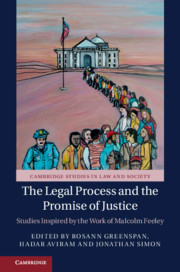Book contents
- The Legal Process and the Promise of Justice
- Cambridge Studies in Law and Society
- The Legal Process and the Promise of Justice
- Copyright page
- Contents
- About the Contributors
- Introduction: Past as Prologue
- Part I The Process Is the Punishment
- Part II Court Reform on Trial
- Part III Judicial Policymaking and the Modern State
- Part IV Political Liberalism and the Legal Complex
- 15 The International Legal Complex: Wang Yu and the Global Response to Repression of China’s Rights’ Lawyers
- 16 The Legal Profession’s Promise of Justice: Choices and Challenges in Legal and Sociolegal Work
- 17 The Varieties of Judicial Independence and the Judiciary’s Role in Political Reform
- 18 The Legal Complex and Lawyers-in-Chief
- Index
- Books in the Series
- References
18 - The Legal Complex and Lawyers-in-Chief
from Part IV - Political Liberalism and the Legal Complex
Published online by Cambridge University Press: 18 April 2019
- The Legal Process and the Promise of Justice
- Cambridge Studies in Law and Society
- The Legal Process and the Promise of Justice
- Copyright page
- Contents
- About the Contributors
- Introduction: Past as Prologue
- Part I The Process Is the Punishment
- Part II Court Reform on Trial
- Part III Judicial Policymaking and the Modern State
- Part IV Political Liberalism and the Legal Complex
- 15 The International Legal Complex: Wang Yu and the Global Response to Repression of China’s Rights’ Lawyers
- 16 The Legal Profession’s Promise of Justice: Choices and Challenges in Legal and Sociolegal Work
- 17 The Varieties of Judicial Independence and the Judiciary’s Role in Political Reform
- 18 The Legal Complex and Lawyers-in-Chief
- Index
- Books in the Series
- References
Summary
In their thought-provoking work on the “legal complex,” Terry Halliday, Lucien Karpik and Malcolm Feeley posit that those who have been trained as lawyers are likely to act on behalf of political liberalism to advocate for the realization of basic civil liberties and access to justice (Halliday and Karpik 1998; Halliday, Karpik and Feeley 2007, 2012). By broadening studies of the legal profession to the study of legally educated elites more generally and examining the way that these elites act in a variety of politically challenging contexts, Halliday, Karpik and Feeley (HKF) have imagined a new relationship between law and politics. In their hands, law is more than persons or institutions; law generally embeds a set of liberal ideas that guide the development of politics.
- Type
- Chapter
- Information
- The Legal Process and the Promise of JusticeStudies Inspired by the Work of Malcolm Feeley, pp. 361 - 384Publisher: Cambridge University PressPrint publication year: 2019
References
- 3
- Cited by



